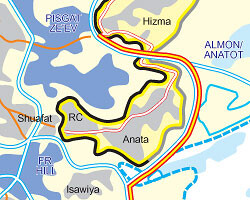Israeli Committee Against House Demolitions 26 July 2004

A map showing the ghetto to be built around the Anata area. The Apartheid Wall is show as the heavy black and yellow line, completely surrounding the village and cutting it off from the rest of the West Bank.
The Jahalin have suffered a long history of harassment and displacement since 1950, when they were forced to leave their land and settle in eastern areas of Jerusalem, extending to Jericho and the Dead Sea. There are currently approximately 7,500 Bedouins in the West Bank, composing 1,500 families, and about 7,500 Bedouins who moved to Jordan. Plans for the northern expansion of Israeli settlement, Ma’ale Adumim, as well as the increasing numbers of demolition orders in the area threaten to expel hundreds of Bedouin families once again.
The Kabu’ah family consists of seven adults, Musa, his two wives, his sons, Muhammed and Ahmed, and their respective wives, and another fourteen children that range between the ages of two and sixteen. They are all Israeli citizens.
The family purchased their plot of land in Anata in 1980. They finished the building of the house in 1998 and moved into the house in 1999. The house had four flats, one for each of Musa’s wives and one for each married son and their family. With the help of a lawyer, the family applied for a building permit in 1999, but it was rejected on the grounds that the land was not zoned for building, but rather as “agricultural land.” In fact, there are some 200 other homes in Anata alone under threat of being demolished for the same reason. Demolition orders have already been issued for many of them. The fact that the land has been legitimately purchased, that the family has Israeli citizenship, and that fines have already been paid for building without a permit, is of no consequence to the Ministry of Interior and the Municipality who administer the demolition orders.
The Demolition
The Kabu’ah family was given notice of the demolition order on May 2, 2004. The notice allowed authorities to demolish within 30 days, beginning 24 hours after delivery. Upon receipt of the demolition order, the family began the appeal process. However, an Israeli district court denied the appeal, and the demolition order was sustained.
At 9 AM on June 2, 2004, approximate 100 soldiers, 20 police officers and four bulldozers arrived at the site of the house. The family refused to leave their home and was thus evacuated by force. Many of the women and children were beaten by the soldiers and police. Media coverage of the demolition was provided by Reuters, the BBC, and the AP. Though none of their reporters or cameras were permitted near the site, they were able to interview ICAHD’s field coordinator, Salim Shawamre. By midday, the house was leveled, a pile of rubble its only remains.
Impact on the Kabu’ah Family
The Kabu’ah family currently lives apart from one another, some staying nearby in an uncle’s house, and the others living in makeshift homes of aluminum siding. Naturally, these living conditions, coupled with the events of the demolition, have left the entire family in a desperate state. The adults still find the demolition extremely painful to discuss, as they have become embittered and depressed since the event. They find it increasingly difficult to face their children knowing that they are useless in protecting and providing for them. All of the children have developed hatred or, at best, fear of any authoritative figure with a gun. Many of the children still have nightmares about the day of the demolition, haunted by images of soldiers and bulldozers. It is even more dismaying that some of the younger children living in the makeshift homes awake their mothers almost every night, insisting that it is late and time to “go home.”
The Rebuilding
It will take place from August 8th to August 22nd. ICAHD will be joined by Israeli, Palestinian and international volunteers, activists and NGO representatives to rebuild the Kabu’ah home in solidarity with the family and the entire community of Anata. Additionally, participants will join artists in renovating and painting a kindergarten in the town as well as cultural and social events that will take place during the two weeks. Tours of Jerusalem, the West Bank, the Negev desert, and the area of the “Triangle” in northern Israel will be offered to volunteers discussing “facts on the ground” in respect to both the Occupation of the Palestinian territories and the consequences of the wall on each side. Discussions, dialogue, lectures and panels by leading Palestinian and Israeli NGO representatives will also take place at Beit Arabiya in Anata, the peace center rebuilt last year in ICAHD’s summer work camp.
More Information
Related Links